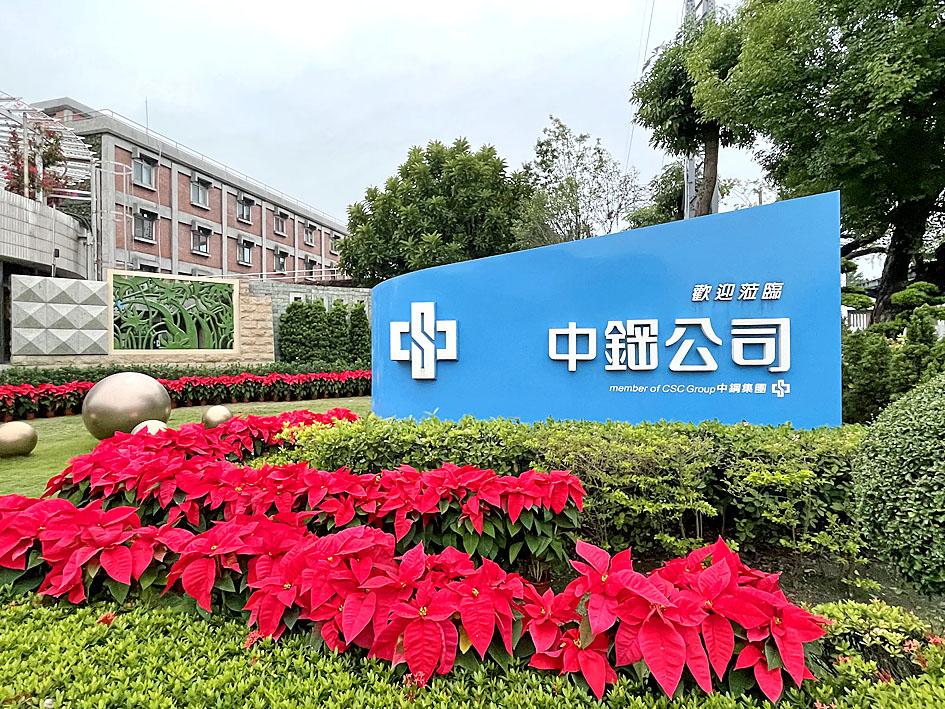China Steel Corp (中鋼), the nation’s largest steelmaker, yesterday said that it would raise steel prices by 2.44 percent on average for shipments next month, as local customers accelerate inventory buildup amid improving demand during the high season.
The company is taking its cue from global peers, which have raised steel prices in response to improving demand from the construction and auto industries, as more countries gradually open their economies and plan to roll out new infrastructure projects in the second half of this year.
China’s Baowu Steel Group Ltd (寶武鋼鐵) and Angang Steel Co (鞍山鋼鐵) have raised domestic steel prices by between 200 yuan and 400 yuan (US$31.55 to US$63.11) per tonne for delivery next month, China Steel said in a statement.

Photo: CNA
That was the first price increase in eight months by the Chinese mills, the statement said.
Formosa Ha Tinh Steel Corp (台塑河靜鋼鐵興業) in Vietnam also raised prices for hot rolled steel and steel rods by US$90 and US$40 per tonne respectively in its latest price quotes, the statement added.
“The global steel industry’s fundamentals are improving with the arrival of the high season, leading to an acceleration in downstream buildup,” China Steel said.
“Global steel prices are returning to an upswing this year, fueled by higher manufacturing costs and better demand,” it said.
In Europe, steel demand has also picked up significantly, benefiting from a regional auto industry recovery, it said.
ArcelorMittal SA has secured long-term supply agreements with European automakers, with prices increasing by between 30 and 50 euros per tonne for its hot rolled steel and cold rolled steel plates, the statement said.
“A rebound in March is a turning point, indicating that the steel industry is moving toward an uptrend into the busy second quarter,” the Kaohsiung-based company said.
Global steel supply is moving in the opposite direction, as some Japanese and South Korean steel mills have cut production following the closure of several steel furnaces, China Steel said.
Chinese steelmakers have scaled down production to comply with Beijing’s restrictions on carbon emissions during the Beijing Winter Olympics, it said.
Increases in manufacturing costs are adding pressure to steelmakers, given record-high prices of iron ore, the major raw material for steel manufacturing, at about U$150 per tonne lately and metallurgical coal prices rising to about US$440 per tonne, China Steel said.
China Steel is raising steel prices by between NT$500 and NT$800 per tonne, following three straight months of cuts.
The prices of hot-rolled steel plates and coils, as well as cold-rolled steel coils, are to rise by NT$800 per tonne next month, while the price of hot-dipped galvanized coils used in construction is also to climb NT$800 per tonne, and that the price of hot-dipped galvanized coils used in home appliances and computers is to increase by NT$500 per tonne, the company said.
The prices of electro-galvanized coils and electrical steel sheets are to advance by NT$500 per tonne next month, it added.

The US dollar was trading at NT$29.7 at 10am today on the Taipei Foreign Exchange, as the New Taiwan dollar gained NT$1.364 from the previous close last week. The NT dollar continued to rise today, after surging 3.07 percent on Friday. After opening at NT$30.91, the NT dollar gained more than NT$1 in just 15 minutes, briefly passing the NT$30 mark. Before the US Department of the Treasury's semi-annual currency report came out, expectations that the NT dollar would keep rising were already building. The NT dollar on Friday closed at NT$31.064, up by NT$0.953 — a 3.07 percent single-day gain. Today,

‘SHORT TERM’: The local currency would likely remain strong in the near term, driven by anticipated US trade pressure, capital inflows and expectations of a US Fed rate cut The US dollar is expected to fall below NT$30 in the near term, as traders anticipate increased pressure from Washington for Taiwan to allow the New Taiwan dollar to appreciate, Cathay United Bank (國泰世華銀行) chief economist Lin Chi-chao (林啟超) said. Following a sharp drop in the greenback against the NT dollar on Friday, Lin told the Central News Agency that the local currency is likely to remain strong in the short term, driven in part by market psychology surrounding anticipated US policy pressure. On Friday, the US dollar fell NT$0.953, or 3.07 percent, closing at NT$31.064 — its lowest level since Jan.

The New Taiwan dollar and Taiwanese stocks surged on signs that trade tensions between the world’s top two economies might start easing and as US tech earnings boosted the outlook of the nation’s semiconductor exports. The NT dollar strengthened as much as 3.8 percent versus the US dollar to 30.815, the biggest intraday gain since January 2011, closing at NT$31.064. The benchmark TAIEX jumped 2.73 percent to outperform the region’s equity gauges. Outlook for global trade improved after China said it is assessing possible trade talks with the US, providing a boost for the nation’s currency and shares. As the NT dollar

The Financial Supervisory Commission (FSC) yesterday met with some of the nation’s largest insurance companies as a skyrocketing New Taiwan dollar piles pressure on their hundreds of billions of dollars in US bond investments. The commission has asked some life insurance firms, among the biggest Asian holders of US debt, to discuss how the rapidly strengthening NT dollar has impacted their operations, people familiar with the matter said. The meeting took place as the NT dollar jumped as much as 5 percent yesterday, its biggest intraday gain in more than three decades. The local currency surged as exporters rushed to